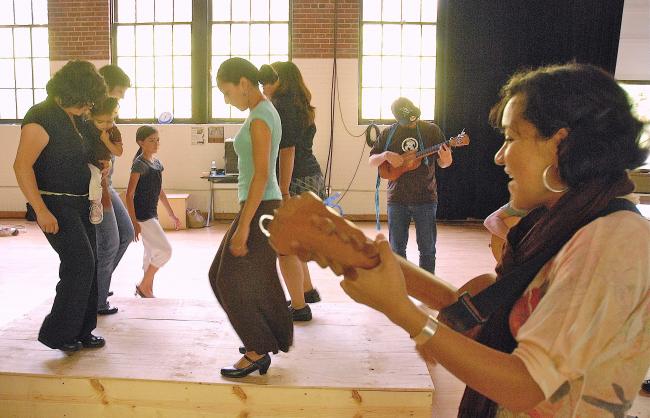Fandango training hits Youngstown Center
Musician Martha Gonzalez leads a workshop at the Youngstown Cultural Arts Center. She is teaching the "son jarocho" style of music and dance for an upcoming Fandango party. More participants are needed.
Fri, 08/14/2009
The Youngstown Cultural Arts Center has been selected as one of three locations to host traditional Fandango training. Fandango goes beyond a typical fiesta with music, dance, singing and even cooking. And boy will this party cook. It lasts through the night until daybreak.
There is no audience at a traditional Fandango, only participants. Dancers male and female hop onto a wooden box called the "tarima" and dance in a style evocative of flamenco and tap. The box has air holes carved around its side transforming this mini-stage into a crude but effective percussion instrument.
The Fandango Project is sponsored by the American Music Partnership of Seattle, a collaboration between UW Women’s Studies, School of Music, Dance Department, KEXP, and EMP, funded by the Paul G. Allen Family Foundation, Youngstown Cultural Arts Center, El Centro De La Raza, The Vera Project, Office of Arts and Culture.
The project is seeking male and female dancers, singers and musicians of all ages, cultures and skill levels to train with experts in a workshop leading up to the day of the fandango. While Youngstown is one of the three hosts for the Fandango workshops, along with a UW location and El Centro De La Raza in Beacon Hill, the actual culmination Fandango, which will bring together all three sites plus fandangueros (people who practice the fandango) from California, will take place at the Vera Project at Seattle Center on October 30th.
Following the Oct. 30 celebration, another Fandango will be scheduled for the Youngstown Center and possibly a South Park location, the dates still to be determined.
While the term “multi-cultural” is tossed around casually these days, this project truly is an exercise in many cultures. The Fandango will follow in the “son jarocho” style from the south of Veracruz, a Mexican state on the Caribbean. Son jarocho is more than 400 years old with West African roots, and some indigenous Indian and Hispanic influences thrown in. Verecruz has a large population that originated in Africa.
“The African influence is due to the fact that Veracruz was a main port for slavery,” said instructor Quetzal Flores. “Those people struggling to find themselves in this horrific, inhumane situation found something beautiful,” he said, referring to their music and dance style.
“Fandango is a party where all these instruments and dances are represented with performers taking turns coming on and off the wooden box. This celebration erases divisions between audience and performers.”
Flores came to Seattle from Los Angeles with his wife Martha Gonzalez who heads the Fandango Project. Both are trained in the son jerocho style of music and dance. Gonzalez was recruited by UW Women’s Studies Department into the PhD program. Flores came as a bonus.
“Son jarocho is performed all over Mexico, Los Angeles, and other American cities,” he said.
“I grew up with the son jarocho sound,” said Estrella De Leon, Youngstown’s Arts Corps programs operations coordinator.” She is volunteering with the Fandango Project as she practices dance moves on "el cajon" and some new “versos” or lyrics.
“My mom is from Tampico just across the bridge to Veracruz,” De Leon explained. “I just learned that my grandfather used to perform and dance son jarocho. I’m from Austin Texas. Son jerocho is now such a big scene all over the country.”
“Fandango is about the son jarocho music, but also a culture and spirit that surrounds it,” said Alberto Mejia, program director for Youngstown Cultural Arts Center who also volunteers at the workshop while learning to play the "tercera", the largest in the“jarana” family of guitars.
‘This project has everything we’re looking for at Youngstown and reflects the values of community, participation and celebration, that we try to embody here, so why not? I have zero musical experience,” added Mejia. “I am jamming with an intention, I’m trying to get the basic strings.
“This music is like the ‘blues from Veracruz.' It has interesting word play, double meanings, and while some ‘versos’ are about broken hearts, it has a lot of playfulness. It’s upbeat to me.”
Professional vocalist Laura Rebolloso and celebrated Veracruz musicians Son de Madera will be coming to Seattle to instruct in the workshop and participate in the Fandango.
To participate in the workshop email Quetzal Flores at: Quetzal@u.washington.edu or phone him at (626) 429-4261.


